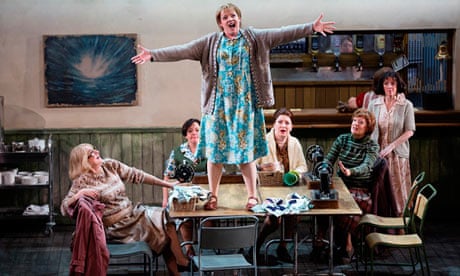A pile-up of swan boats or glut of sword-bearing heroes might have seemed inevitable for Wagner's 200th anniversary. I could not have predicted the problem would be Dutchmen. First came a bold staging by NI Opera in Belfast, followed by a dazzling concert performance by Andris Nelsons and the CBSO in Birmingham. Now Scottish Opera has joined in with a striking new production of The Flying Dutchman conducted by Francesco Corti. Unexpectedly, this early Wagner work has not only survived such ubiquity but now seems more remarkable than at the start of these close encounters.
Which was best? Each had its brilliant moments is the judicious verdict. Regrettably opera is more and more spoken of as a competitive sport. I'm thinking of two issues: the "Pappanogate" war of words over the commitment of singers, still rumbling on with all the lassitude of the late Crusades – what was it all about? – and also the attempt to suggest, in the light of the brave new International Opera awards taking place on 22 April, that for a UK company not to dominate the shortlist is some sort of failure.
The variables of work, talent and taste which come together on the day, as well as the openness of one's own response on any given occasion, are all that count. We should cheer those who get recognised and stop taking a cudgel to the absentees. (And, speaking as a frequent and phlegmatic juror, let's not mention the "Buggins' turn" compromises, the pleadings, the undeclared interests and near athletic attempts to address gender balance of even the best juries.) Anyway, reservations aside, we're at the height of the awards season, so congratulations to Mark Elder and the Hallé, as well as other recipients at last week's unimpeachable BBC Music Magazine awards, and to the array of nominees, announced three days ago, for the equally admirable RPS awards which take place next month.
To continue. While the Belfast Dutchman placed the action in 1970s Ireland, so Scottish Opera has updated it to the same period in the eastern fishing port of Peterhead, Aberdeenshire. Wagner's own idea was to give the opera a Scottish setting – riding on early 19th-century romantic enthusiasms for Walter Scott, Ossian and the like. Later he switched the scenario to Norway. To no great effect, since the opera is sung in German, Scottish Opera's director, Harry Fehr, has restored the original names of some of the characters. Daland the Captain has become Donald, Erik a gun-toting minister called George.
Yet the bleak mood and toughness of the dying fishing industry works well. Corti maintained brisk speeds and, if not quite coruscating, the orchestra played with insight and energy. In Tom Scutt's designs, lit by James Farncombe, reality and suggestion meet with convincing resonance: a steamy chip shop beneath the quayside, a slightly uncertain geography of sea and land and the ghostly apparition of the Dutchman's ship rising out of a heavy maritime mist. The women spin and sew, on Singer machines, in a community hall with tongue-and-groove, tubular chairs, bunting and curled sandwiches.
Amid all this, Senta, sung with fearsome strength by Rachel Nicholls – an outstanding Brünnhilde in Longborough's Ring Cycle, to which she returns this summer – seems more unhinged and alone than ever. The Latvian Peteris Eglitis, making his company debut, was singing his first Dutchman. Despite already being an experienced Wotan, he sounded underpowered and only towards the end really cut through with those long, scorching vocal lines the role demands. The chorus, as in Belfast and Birmingham, shone. The UK has impressive opera choruses and choral directors right now. Jeff Gwaltney's George/Erik, Scott Wilde's Donald, Sarah Pring's Mary and, especially, Nicky Spence's Steersman made up the expert cast. Spence's rumbustious yet delicate ceilidh display, with his troosers slipping down, could go viral if someone puts it on YouTube.
Without electronic assistance, music scarcely comes louder or more thrilling than in the last act of Dutchman, as Wagner cranks up volume and tension towards the final cataclysm. In contrast, his fellow anniversary composer, the English lutenist John Dowland (1563-1626), is a master of quietude. His music, full of melancholy, has a glowing intimacy which never seems to rise beyond a whisper. His biography is full of blanks, disappointments and mysteries – probably born in London, in courtly service on the continent, variously Protestant and Catholic. At one time in Florence he was caught up in treasonable activities and promised a large pension by the pope "and that his holynes & all the cardinals would make wonderfull mutch of me", which only goes to show.
The viol group Fretwork remain supreme interpreters of Dowland, his work central to their repertoire. Their current season includes performances (repeated in Salisbury on 28 May) of his consort collection Lachrimae or Seven Teares (1604), based on his own song Flow my teares which forms the opening pavan. The falling tear motif, probably not Dowland's own idea, given the fashion for musical displays of sorrow and weeping at the time, occurs repeatedly in the sequence for five viols and single lute. The bowed ensemble sound together against the plucked virtuosities of lutenist Elizabeth Kenny, harmonic suspensions clash in despair and resolve in consolation.
Dowland sums it up best in his dedication, confessing that tears may be unwelcome guests, but "the teares which Musicke weeps" can be pleasant: "neither are teares shed always in sorrow but sometime in joy and gladnesse". In every sense this ethereal music deserves the keen ears for which it was designed.

Comments (…)
Sign in or create your Guardian account to join the discussion